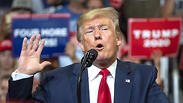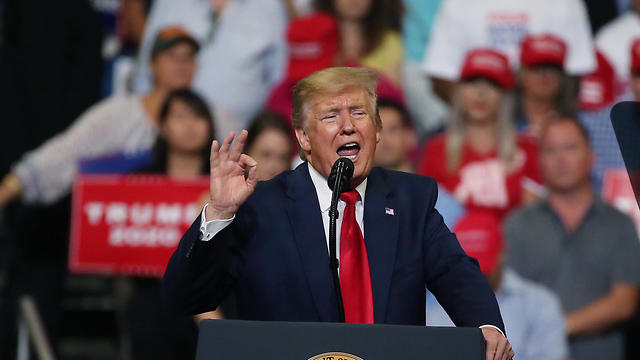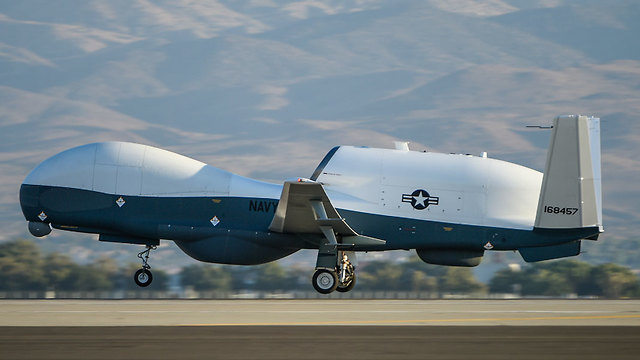
If it looks like an Iran war and sounds like an Iran war...
Analysis: Trump could not bear the thought of abiding by a nuclear agreement signed by Obama and would rather listen to his armchair generals than the U.S. intelligence community, but he might be convinced that another bloody regional war would cost him at the polls
We can and must start with the bottom line and the obvious conclusions: A war between the United States and Iran is very possible.
The assumption that the U.S. could carry out an effective "surgical assault" and that this military strike would be limited to combined action by air force and missiles and the elimination of the entire Iranian nuclear infrastructure within two hours is highly questionable.
The assumption that Israel will not participate in this war and just stand on the sidelines, as anonymous parties have stated – is outrageous.
Often in history, when signs of war grow and multiply, and when implications for war are taken as threats from both sides, the result is typically war.
Even though the decision makers, the intel personnel, and the pindits think that war is unnecessary, that "no side really wants it", and that negative outcome is superior to the potential achievements, those signs have their own strengths and dynamic.
When it looks like a war, sounds like a war, and acts as a war, it's probably a war.
The tension started when the United States withdrew from the nuclear agreement with Iran, even though 10 consecutive documents from the International Atomic Energy Agency stated that Iran was abiding by the terms of the deal.
President Trump chose a one-sided withdrawal against the wishes of the other signatories - France, Great Britain, Russia, China and Germany. To Iran, the withdrawal was proof that there is no trusting the United States and its commitments to an international agreement that it had actually proposed.
The reason that the United States withdrew is not because of Iran's actions or legitimate criticism about the quality of the original agreement. The reason is President Donald Trump.
Iran is an unstable local agent that provides financial sponsorship and weapons to terrorists. It's as if the agreement wasn't actually meant to take care of Iran's regional behavior and desire for hegemony, but instead to obstruct its path to a nuclear arsenal.
This was an achievable agreement in 2015. Not a good agreement, but the best agreement that could be reached at the time.
The withdrawal is the outcome of two factors: First, the fact that former president Barack Obama signed the agreement is something that Trump simply cannot stand; and second, Israel and Saudi Arabia pressed the U.S. to withdraw from the agreement, without any substitution, without convincing the allies that cosigned it, and without an orderly policy for the day after.
"We'll leave, drop sanctions, and see what happens" seems to have been the prevailing attitude.
A few months after its withdrawal, the United States imposed powerful sanctions on Iran and described them as "maximum pressure" and although their purpose was unclear, Secretary of State Mike Pompeo said they would continue.
To Trump's understanding, this is meant to bring Iran back to the negotiating table to form another, better agreement.

The situation, Trump believes, is like that of North Korea. Iran is now testing the United States, its determination and the seriousness of its intentions, and is acting as if it has nothing to lose.
The U.S. sends an aircraft carrier to theGUlf? Iran says it will raise the amount of uranium stores above the authorized amount. The United States speaks about "lethal choreographed attacks"? Iran strikes at least four oil tankers off its coast.
The United States has backe ditself into a sitaution in which it is acting without an international coalition, without support from allied countries during a military operation.
Meanwhile, the two countries that pushed the U.S. to withdraw from the agreement, set sanctions and threaten Iran - Israel and Saudi Arabia - are making innocent faces, as if Hezbollah isn't armed with thousands of missiles and Iranian Al-Quds force commander Qasem Soleimani is chatting to Hezbollah leader Hassan Nasrallah every week.
It is undeniable that Iran is a dangerous country, but the actual problem here is Trump.
His assumption that reality can be whatever he wants, his cabal of armchair generals and the blatant and total disregard for the advice and assessments of the American intelligence community are the problem.
Nonetheless, Trump is not eager to use force and has no real interest in Iran.
If someone could convince him that making the price of oil rise dramatically, embarking on another war with the inevitable loss of life in the Middle East, and giving ammunition to his Democratic rivals would be a recipe for electoral disaster, he could be easily persuaded to stand down.
Until then, the signs of war are growing ever stronger.












